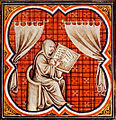Portal:Biography
The Biography Portal
A biography, or simply bio, is a detailed description of a person's life. It involves more than just basic facts like education, work, relationships, and death; it portrays a person's experience of these life events. Unlike a profile or curriculum vitae (résumé), a biography presents a subject's life story, highlighting various aspects of their life, including intimate details of experience, and may include an analysis of the subject's personality.
Biographical works are usually non-fiction, but fiction can also be used to portray a person's life. One in-depth form of biographical coverage is called legacy writing. Works in diverse media, from literature to film, form the genre known as biography.
An authorized biography is written with the permission, cooperation, and at times, participation of a subject or a subject's heirs. An autobiography is written by the person themselves, sometimes with the assistance of a collaborator or ghostwriter. (Full article...)
Featured biographies –
Zhang Heng (Chinese: 張衡; AD 78–139), formerly romanized Chang Heng, was a Chinese polymathic scientist and statesman who lived during the Han dynasty. Educated in the capital cities of Luoyang and Chang'an, he achieved success as an astronomer, mathematician, seismologist, hydraulic engineer, inventor, geographer, cartographer, ethnographer, artist, poet, philosopher, politician, and literary scholar.
Zhang Heng began his career as a minor civil servant in Nanyang. Eventually, he became Chief Astronomer, Prefect of the Majors for Official Carriages, and then Palace Attendant at the imperial court. His uncompromising stance on historical and calendrical issues led to his becoming a controversial figure, preventing him from rising to the status of Grand Historian. His political rivalry with the palace eunuchs during the reign of Emperor Shun (r. 125–144) led to his decision to retire from the central court to serve as an administrator of Hejian Kingdom in present-day Hebei. Zhang returned home to Nanyang for a short time, before being recalled to serve in the capital once more in 138. He died there a year later, in 139. (Full article...)
Susanna Lee Hoffs (born January 17, 1959) is an American singer-songwriter and actress. She, Debbi Peterson, and Vicki Peterson founded the Bangles in 1981. Their debut album, All Over the Place, (1984) was acclaimed by critics but sold poorly. Their second album, Different Light, (1986) was also warmly received by critics and was certified double-platinum in 1987 and triple-platinum in 1994. It contained the US number two single "Manic Monday" written by Prince and the number one single "Walk Like an Egyptian". The group's third album, Everything (1988), included the US top ten charting "In Your Room" and number one "Eternal Flame", both written by Hoffs with Billy Steinberg and Tom Kelly. Hoffs was lead vocalist on five of the seven Columbia singles by the Bangles, which contributed to a public perception that she was a lead singer, even though all four members took lead vocals across their output. Following tensions including resentment at Hoffs's perceived leadership and the stress of touring, the band split in 1989. It reformed in 1999 and released the albums Doll Revolution (2003) and Sweetheart of the Sun (2011).
Hoff's first solo album, When You're a Boy (1991), was followed by Susanna Hoffs (1996). Neither of the releases proved to be as popular as the Bangles' albums, although they yielded two charting singles in the US, the top 40 hit "My Side of the Bed", and "All I Want". She recorded several songs for films and formed the faux-British 1960s band Ming Tea with Mike Myers and Matthew Sweet. Hoffs teamed with Sweet to produce Under the Covers, a series of cover song albums. Her 2012 album Someday was followed by two more cover albums Bright Lights (2021) and The Deep End (2023). (Full article...)
Artur Gustav Martin Phleps (29 November 1881 – 21 September 1944) was an Austro-Hungarian, Romanian and German army officer who held the rank of SS-Obergruppenführer und General der Waffen-SS (lieutenant general) in the Waffen-SS during World War II. At the post-war Nuremberg trials, the Waffen-SS – of which Phleps was a senior officer – was declared to be a criminal organisation due to its major involvement in war crimes and crimes against humanity. An Austro-Hungarian Army officer before and during World War I, Phleps specialised in mountain warfare and logistics, and had been promoted to Oberstleutnant (lieutenant colonel) by the end of the war. During the interwar period he joined the Romanian Army, reaching the rank of General-locotenent (major general), and also became an adviser to King Carol. After he spoke out against the government he was sidelined and asked to be dismissed from the army.
In 1941 he left Romania and joined the Waffen-SS as an SS-Standartenführer (colonel) under his mother's maiden name of Stolz. Seeing action on the Eastern Front as a regimental commander with the SS Motorised Division Wiking, he later raised and commanded the 7th SS Volunteer Mountain Division Prinz Eugen, raised the 13th Waffen Mountain Division of the SS Handschar (1st Croatian), and commanded the V SS Mountain Corps. Units under his command committed many crimes against the civilian population of the Independent State of Croatia, German-occupied territory of Serbia and Italian governorate of Montenegro. His final appointment was as plenipotentiary general in south Siebenbürgen (Transylvania) and the Banat, during which he organised the evacuation of the Volksdeutsche (ethnic Germans) of Siebenbürgen to the Reich. In addition to the Knight's Cross of the Iron Cross, Phleps was awarded the German Cross in Gold, and after he was killed in September 1944, he was awarded the Oak Leaves to his Knight's Cross. (Full article...)
Kellie Loder (born 1988) is an independent singer-songwriter from Newfoundland who plays drums, guitar and piano. They have released three albums: The Way in 2009, Imperfections & Directions in 2010 and Benefit of the Doubt in 2018. With a voice that St. John's-based newspaper The Telegram has described as "powerful yet serene and soulful", they received critical recognition from Canada, including a nomination at the Juno Awards.
Having written their first song at age 16 about a cousin who died in a traffic accident, Loder was studying nursing at the Grenfell Campus of Memorial University of Newfoundland when they released The Way in August 2009. Later that year, Loder won a talent-search contest hosted by YC Newfoundland, a Christian youth conference. As part of the award, Loder was given time with music industry and production professionals who helped them with Imperfections & Directions, which was released at the 2010 YC Newfoundland. The album was nominated for Contemporary Christian/Gospel Album of the Year at the 2012 Juno Awards. Loder is also a nominee of three MusicNL awards, including Gospel Artist of the Year in 2011. (Full article...)
Vice Admiral Sir Alan Wedel Ramsay McNicoll, KBE, CB, GM (3 April 1908 – 11 October 1987) was a senior officer in the Royal Australian Navy (RAN) and a diplomat. Born in Melbourne, he entered the Royal Australian Naval College at the age of thirteen and graduated in 1926. Following training and staff appointments in Australia and the United Kingdom, he was attached to the Royal Navy at the outbreak of the Second World War. As torpedo officer of the 1st Submarine Flotilla in the Mediterranean theatre, McNicoll was decorated with the George Medal in 1941 for disarming enemy ordnance. He served aboard HMS King George V from 1942, sailing in support of several Arctic convoys and taking part in the Allied invasion of Sicily. McNicoll was posted for staff duties with the Admiralty from September 1943 and was involved in the planning of the Normandy landings. He returned to Australia in October 1944.
McNicoll was made executive officer of HMAS Hobart in September 1945. Advanced to captain in 1949, he successively commanded HMAS Shoalhaven and HMAS Warramunga before being transferred to the Navy Office in July 1950. In 1952, McNicoll chaired the planning committee for the British nuclear tests on the Montebello Islands, and was appointed commanding officer of HMAS Australia. He commanded the ship for two years before it was sold off for scrap, at which point he returned to London to attend the Imperial Defence College in 1955. He occupied staff positions in London and Canberra before being posted to the Naval Board as Chief of Personnel in 1960. This was followed by a term as Flag Officer Commanding HM Australian Fleet. (Full article...)
Elias Ashmole FRS 23 May 1617 – 18 May 1692) was an English antiquary, politician, officer of arms, astrologer, freemason and student of alchemy. Ashmole supported the royalist side during the English Civil War, and at the restoration of Charles II he was rewarded with several lucrative offices.
Ashmole was an antiquary with a strong Baconian leaning towards the study of nature. His library reflected his intellectual outlook, including works on English history, law, numismatics, chorography, alchemy, astrology, astronomy and botany. Although he was one of the founding Fellows of the Royal Society, a key institution in the development of experimental science, his interests were antiquarian and mystical as well as scientific. He was an early freemason, although the extent of his involvement and commitment is unclear. Throughout his life he was an avid collector of curiosities and other artefacts. Many of these he acquired from the traveller, botanist and collector John Tradescant the Younger. Ashmole donated most of his collection, his antiquarian library and priceless manuscripts to the University of Oxford to create the Ashmolean Museum, Britain's first public museum. (Full article...)

![Image 1 Boone depicted in an 1820 portrait by Chester Harding, the only known portrait of him made during his lifetime Daniel Boone (November 2 [O.S. October 22], 1734 – September 26, 1820) was an American pioneer and frontiersman whose exploits made him one of the first folk heroes of the United States. He became famous for his exploration and settlement of Kentucky, which was then beyond the western borders of the Thirteen Colonies. In 1775, Boone blazed the Wilderness Road through the Cumberland Gap and into Kentucky, in the face of resistance from Native Americans. He founded Boonesborough, one of the first English-speaking settlements west of the Appalachian Mountains. By the end of the 18th century, more than 200,000 emigrated people had entered Kentucky by following the route marked by Boone. Boone served as a militia officer during the Revolutionary War (1775–1783), which was fought in Kentucky primarily between American settlers and British-allied Indians. Boone was taken in by Shawnees in 1778 and adopted into the tribe, but he resigned and continued to help protect the Kentucky settlements from the tribes they belonged to. He allegedly also left due to the Shawnee Indians torturing and killing one of his sons. He was elected to the first of his three terms in the Virginia General Assembly during the war and fought in the Battle of Blue Licks in 1782, one of the last battles of the American Revolution. He worked as a surveyor and merchant after the war, but went deep into debt as a Kentucky land speculator. He resettled in Missouri in 1799, where he spent most of the last two decades of his life, frustrated with legal problems resulting from his land claims. (Full article...)](http://upload.wikimedia.org/wikipedia/en/d/d2/Blank.png)












































